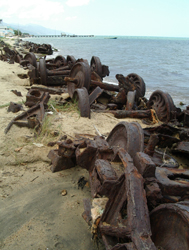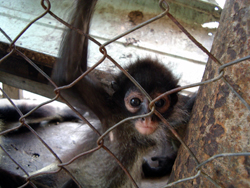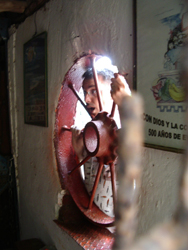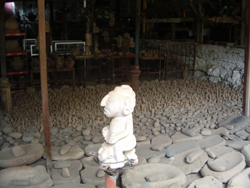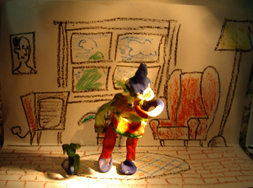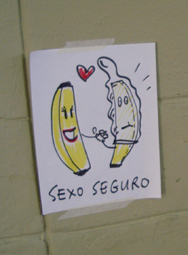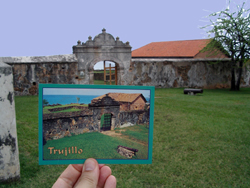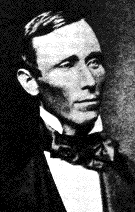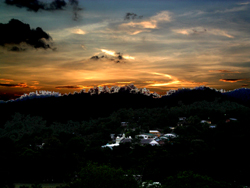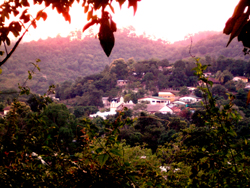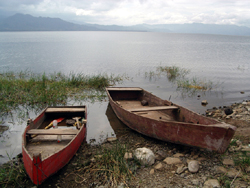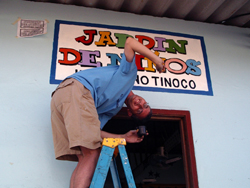Jungle Juice and Passion Fruit
Dispatch from the Caribbean Coast - September 2004

|
|
Under the Coconut Tree Honduras spans the Central American peninsular with a Caribbean coastline on the north and a Pacific one in the south. When the Spaniards colonized they didn’t have their eye on future tourism potential and set up cities inland (away from the heat is my guess but who knows with the Spanish). It wasn’t until the banana companies needed ports to ship their wares north did any semblance of a settlement on the coasts, except whoops…. there were already a bunch of people there already…some descendants of shipwrecked slaves had settled decades before all along the beaches. You know the rest. Needless to say there are now scattered Garífuna communities being pushed aside by big hotel resorts. Gentrification and greed combining to create suffering in the surf. |
|
However we found a little slice of heaven in Trujillo. Easily Honduras’s nicest locale, Trujillo’s geography saved it from the wrath on hurricane Mitch. It clings precariously to the slopes of tropical mountains as they plunge into the Caribbean. Trujillo even remains remote to Honduras and, although only two hours (if unlike us you get the express bus) from La Ceiba it is rarely visited by eager tourists who are more anxious to get to the Bay Islands. Thus there seems a sort of harmony within the community where food, music and celebration are as mixed as the ethnicity of the people and tourism has yet to unpack the sunscreen let along spread the beach towl of destruction along the seafront (okay, that's enough globalization metaphors). Our real reason for being at the beach was to undertake a training session for HIV/AIDS awareness. We were locked in a plush hotel with flip charts and name tags for three days and then they gave us a certificate and—bleary-eyed by this point—we were allowed to leave. We were allowed to bring along a "partner" from our local communities so I was accompanied by my official counterpart from the Zacapa Cultural Center and Julia invited our friendly nurse. |
1001
Uses for a dead train # 1: a tidal breakwater |
|
Like everywhere in the world Hondurans are generally hugely ignorant of HIV/AIDS issues and education at this point is crucial for prevention. Somewhat encouragingly, education for youth seems to be having an impact although infection rates are still really high. “Abstinence” and prayer are still commonly advocated forms of prevention. Everyone had to practice putting condoms on bananas. I had never put a condom on a banana before. It’s easy enough to put them on but much harder (excuse the pun) to take them off. They were pretty big bananas (a local variety called "ginea") and whereas “in the field” there is a certain amount of “shrinkage” to facilitate the removal, none such size reduction occurs with a banana. |
| The World's Most Eclectic Museum The
term pack-rat is utterly inadequate to describe Rufino Galán.
There is also a thin line between genius and completely cuckoo crazy-ape
two fish short of an aquarium bonkers. I don’t know where on the
insanity scale Señor Galán lies because sadly we were
unable to meet him in person. We did see him dozing in his hammock.
Even obsessive compulsive hoarders need forty winks I guess. They say
that humankind evolved from groups of hunter and gatherer communities
and Rufino Galán was clearly predisposed to the latter. Furthermore
just having one of something wasn't enough for Trujillo's collector
supreme. The more the merrier on the rationale that that seventeen identical
items looks much more impressive that one, especially when the item
has absolutely no historical worth whatsoever. With this in mind we
approached the collection with curious caution. |
|
|
|
The museum is his life’s work. It’s quite clear he hasn’t thrown out a thing. You enter the museum through a safe door that belonged to the O’Glynn hotel . It’s a huge warehouse where the lights are turned on in each section as you walk through to reveal vast (and we’re talking hundreds and thousands ) of objects. The pre-colonial section has lots of guns and bits of old rusty printing press equipment. The highlights of the “colonial” section featured a street lamp, a 1970s record player, a vast cabinet of stuffed animal parts and bones (doubtless the natural history section), hundreds of typewriters, a waffle iron, some toasters (one still worked), a light bulb, old bottles, a near complete set of worldwide currency and stamps, bits of computers, a telephone exchange system, road signs, surgical equipment, cannonballs, and about thirty of those big hefty calculating machines that used to be a feature of accounting offices where they took up half a desktop but these days are the size of a postage stamp. The pre-Colombian section was even more amazing. The floor was strewn with artifacts, idols and instruments. His wife explained that they had all been obtained legally and although he'd had numerous offers to sell pieces the collection remained complete. |
Rufino has a distinguished history. He worked all his life at the United Fruit Company. His wife (who doesn’t consider her husband the least bit odd or out of the ordinary) told us that the mayor of Trujillo wanted him locked up because he was crazy. The mayor said the collection was a junk yard, not a cultural institute of leaning and hit the museum up for a gazillion dollars in back taxes. The museum was closed for a year but when a new mayor was elected Rufino was forgiven and the museum opened again. Nothing escapes the collection. When a US cargo plane crashed of the north coast in 1985 the wreck was hauled up to the museum. The 12 foot high wheels stand outside the museum. |
|
|
|
Coca-Cola verses Pepsi You may not be able to find clean drinking water in many parts of Honduras but you can buy Coca-Cola or Pepsi anywhere! As you probably know the folks at Coca-Cola and Pepsi corporation manufacture products run the gamut from potato chips to candy and bread to biscuits. Here’s the
deal. If you’re a store owner and want to stock Coke or Pepsi
you can only deal with the suppliers directly who run their own national
distribution systems. You get a discount if you let Coke or Pepsi paint
their logo all over your walls. And here’s the rub. You can only
choose one of them. If you don’t show 100% loyalty the deals off.
And who’s going to argue. So Honduras has only two kinds of store.
Coke or Pepsi. |
Honduran lore has it that once upon a time, someone tried to start a rival beverage company called "Copan Dry" (I guess like Canada Dry). On the first day of sales, all the bottles were purchased in bulk and smashed, thus rendering useless the recycling program. Thugs set fire to the delivery trucks, intimidated the workers and the factory was destroyed. Now I couldn't possible speculate who might be responsible here on these humble yet often scrutinized pages but it's just not cricket in my opinion and certainly not within the rules of healthy Capitalist competition. But wait. I had a revelation. Coca Cola and Pepsi are playing a crucial part in the class struggle. Yes, that’s right. Coca-Cola, that corporate ogre is the great leveler! And why’s that you may ask? Well, there is no rich persons version of coke. No matter how many millions you have stashed away when it comes to distilling your special reserve whiskey or rum with a suitable soda you’re gonna be mixing it with exactly the same concoction that a Honduran farmer is chugging down with his beans and tortilla. There’s no alternative. Perrier tried for a while to convince us that their “naturally carbonated beverage” was worth forking over a few coins more that good old Club Soda but basically that’s it! |
|
Go Bananas In my own Quixotic way I thought it might be fun to start up a "World Cinema" evening here at the culture center where I work. We have a digital projector and a DVD player and I have enough Spanish language subtitled or dubbed movies to show one a week for a good few months. Projected onto the wall it makes a pretty good screening space. Thus was born "Cine Zacapa". So I start off by designing a schedule. Big mistake! It seems unless you shove something under a Honduran's nose they will forget about it in five minutes. It’s just one of those famous cultural differences. |
|
|
I figured, let’ start them off with something light then move on to the more challenging stuff. “Bananas” seemed like a good bet. A Woody Allen comedy set in Central America. One of the early funny ones. Honduran’s have TV in most urban centers. There are probably around 300 TVs in Zacapa. Thus soap operas and action movies are seen by a fair number of the population. So the first week I drummed up a lot of interest. We put up posters and announced it on the radio and over the town PA system (situated in the church steeple) . About 40 people shuffled in including a group of 14 men who were visiting our local priest. It cost 5 Lempiras to get in (about 5 cents). I made a brief introduction to the piece and explained the context of the HUAC committees and the CIA clandestine support of military dictators in Latin America. I knew it would
be interesting watching everyone watch the movie. They laughed very
hard anytime anyone got their fingers smashed in a locker door or fell
into a manhole. Other than that they sat in absolute silence. |
After the movie I rushed outside to ask them what they thought. One person said they didn’t “get the message”. Another asked why the fascist dictator was allowed to escape. Why didn’t the hero go after him and kill him? However they all said they enjoyed it, which was good. Next week I showed some animations from the Czech Republic. Two people showed up. Of course when we showed the live World Cup qualifying match between Honduras and Costa Rica (5-2) we sold tickets for 20 Lempiras and we were turning people away at the door. [sigh] |
|
|
|
The World's Least Missed Man Back from the days of derring-do, William Walker-- the so-called gray-eyed man of destiny—lies buried in Trujillo. The Tennessee born Walker was what was then called a Filibuster (soldier of fortune/adventurer) but these days would no doubt be called an evil-doing terrorist. Born into a rich family he certainly wasn't doing it for the money. At 5' 4" tall my theory is that he had short man's complex. He was in fact a pro-slavery white supremacist. He had a habit of invading countries (five times in total) accompanied by groups of ruthless thugs that he would recruit from the rough and tumble docks of San Francisco, declaring himself president and immediately receiving the recognition and support of the US who were more than happy to have someone supporting their commercial interests. In fact for a while he was quite the hero back home. On no less than five occasions his exploits filled the entire front page of the New York Daily Times. |
| In 1855 he managed to take Nicaragua with just 56 men. One assumes with significantly superior firepower. However, following his victory speech (during which he inconceivably declared the countries official language to be English), Walker rubbed Cornelius Vanderbilt up the wrong way by interfering in his plans to monopolize Central America with his railroad & steamships. Vanderbilt convinced the locals to kick up a bit of a fuss and Walker faced a turning worm. Guess what, the US Navy had to come rescue him. On this fifth attempt to invade and become ruler of all five Central American republics he was caught by the British in Honduras. They didn’t see the humor in the situation and turned him over to the Hondurans for execution. His grave lies in a gated up overgrown cemetery with a simple stone with his name and “fusilado” (executed) inscribed on the slab. We had to climb over the wall to take a picture because (we were told by the tourist office) it’s too often used as a urinal and/or illicit trysting place. |
|
|
|
Honduran Justice It’s a long
story but basically a young woman was attacked, sexually molested and
then stabbed in a nearby town by one of our local bus drivers. The story
even made the local news channel. The driver who has a large family
in Zacapa was locked up for several weeks until his hearing. A judge
ruled that he should remain in jail without bail. However, the outraged
citizens of Zacapa, in an unprecedented moment of motivation decided
to form a posse. Yelling and screaming, they convoyed in several busses
and trucks to confront the justice system. The accused was released
and Zacapa hosted the largest celebration we have ever seen. A new hero
had been found. |
It was a frightening display of popular action. What is sad is that the victim was from a poor family who not only had to deal with the emotional and physical aftermath of the attack became ostracized. When we asked several of the usually upstanding community leaders about the “evidence” the only answer we got was that the accused was a “good man from a good family who would never do such a thing”. Now I’ve
been around. I’m not wet behind the ears. I’ve been in political
demonstrations that have turned ugly. I’ve seen riots, fights,
witnessed first hand British football hooligans and Republican conventions.
But I’ve never witnessed anything like the raw self-deluded emotional
righteousness of a normally tranquil community like ours. It was fricken
scary and now we have an accused rapist loose in our town. C’est
la vie or as the French say, “That’s Life”. |
|
|
|
We may already be a winner Guess what. We won the Peace Corps worldwide photo competition! I don’t think we actually won anything other than the pride and knowledge that our photo is being hung on the wall in the Washington DC office but it’s something, right? I say “we” because although I took the photo, Julia's name is on it. We were allowed only three entries so I got greedy and sent in three more photos under Julia’s name (just to increase the odds!) and so it serves me right that Julia is getting all the praise and recognition. The photo shows
some fishing boats by the lake. Not an especially thrilling photo in
my opinion but maybe that's why I'm in Honduras and not sitting in my
Tribeca loft space designing covers for the New Yorker. |
| Death of a Firefly An all-year round fixture of Zacapa are the abundant and fascinating fireflies which emerge around sunset and fleck the twilight with their tiny glowing bodies. One of the saddest things I have seen is a mortally wounded firefly. I spent several minutes watching as its little light dimmed and finally went out. By day they are profoundly boring insects, lacking in any visual personality. In fact they are not flies at all but beetles! In the US, the term glowworm is used to describe firefly larvae but glowworms are actually a different species altogether found only in Europe. |
|
|
|
I
always thought they produced their little lamps by absorbing the suns
rays by day like a miniature solar panel fuel cell, but I was wrong!
Fireflies produce light via a chemical reaction consisting of a substrate
compound combined with an enzyme and oxygen. Even their eggs and lava
glow. Apparently (I learned from our good friend the Internet) if you
see a flickering firefly it’s a male hoping to “get it on”.
The faster the flicker the friskier the female gets! Some species of
fireflies are able to synchronize their flashing so that they all flash
in unison, on and off at the same time. This usually results in a huge
orgy of glorious firefly sex which is probably a bit of a relief if
your life only lasts 7-14 days. |
Deranged wittering, etc. Thus I sign off
on another exciting and thrill-packed dispatch. Life plods on. Already
the second group of eager volunteers to begin since we arrived are being
put through their paces in the training center. I'm nursing a fractured
finger which I thoroughly deserved after attempting to neutralize a
cockroach the size of a Buick and ended up punching the floor. I have
received little sympathy in my suffering but at least it raises a smile.
Laughter is all some people have after all. My aims in life are humble.
I want this experience to be a document. I want to hold a mirror up
to life. I want this to be a picture of dignity ... a true canvas of
the suffering of humanity. But with a little sex in it as they say.
Just another day atop this hill of beans in this crazy cock-eyed caravan.
|
|

Previous dispatch | Next dispatch
©
J. Lemon / Lemonworld 2005. All rights reserved. This
web site is not an official publication of the Peace Corps or the U.S.
Government. The contents of this Web site reflect the personal opinions
and observations of the individual(s) contributor(s) and do not reflect
any position of the U.S. Government or the Peace Corps. |

